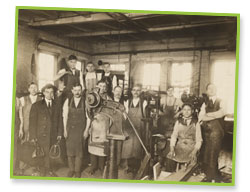His Father's Namesake
High School: Grades 9–12
Story
Page: 1 | 2 | 3 | 4 | 5 | 6 | 7
On the 4th of May in 1886, as on so many other evenings, seven-year-old Albert Jr. and his sister Lucy had accompanied their parents out of the house for a meeting. The meeting assembled at 107 5th Avenue at their father's place of work. Albert Parsons was the editor of The Alarm, the English language version of a socialist German paper, Arbeiter-Zeitung. The group assembled had met before—they called themselves the American Group. Albert Jr. was pretty sure the opinions and feelings he would hear tonight were the same he had heard before.
He could recite some of his parents' political beliefs, even though he could not yet understand them: the best form of government is no government; even a socialist or communist government is inherently unfair because a few have political control over an oppressed majority; capitalism and the wage system exploit the worker; the only way for workers to get what they deserve is by armed revolution; anarchy, when no hierarchy exists, is when individuals are truly in a democratic state.
Albert Jr. sat and watched the meeting. Tonight, however, he took more of an interest than usual. Before his father began to speak about how to organize the sewing women of the city, there was much talk among the assembled of a riot the day before at the McCormick Reaper Works. Union workers had been locked out since February and the factory had replaced them with non-union workers. A colleague of Parsons, August Spies, had been talking to yet another group of striking workers at a nearby factory. Some of the listeners broke away from Spies's talk and joined their fellow strikers at the McCormick plant to heckle the non-union replacements as they left the factory. The hecklers started to throw stones. Albert Jr.'s eyes widened as he heard what had happened next. Police showed up at the plant and used clubs and guns to quell the melee that had broken out. Two workers were killed.
Whenever his father spoke, Albert Jr. noticed the assembled would lean in toward him so they would not miss a word. Sometimes the meetings he attended with his parents were fun; some were even picnics and parades. But the tone at this meeting was very serious and solemn. He knew his parents were passionate about their work and that many people looked to his father for guidance. His parents' conversations with others about their beliefs were passionate, frequently long and featuring voices that rose in a crescendo. As a six-year-old, he was confused by this passion; it always took him aback. But he had not recognized until this incident at the McCormick factory that the passion could lead to violence. Suddenly he wanted to be home. He met his father's eyes and tried to send the message that he wanted to run into his arms, sit on his lap, and hear a story in front of the fire. His father looked away and continued to address the meeting.
Albert Jr. took his small wooden train with him into a corner. Nearby he noticed two young men huddled together. One man held the other's arm as he spoke. He was flush with excitement. "Hans, I wanted you to come tonight to hear this very, very intelligent man, Albert Parsons, speak. Although I know that this meeting is about organizing the sewing women in the city who work too may hours for too little pay, it is ultimately about all the workers in this city and how we must organize."
Downloads (pdf)


